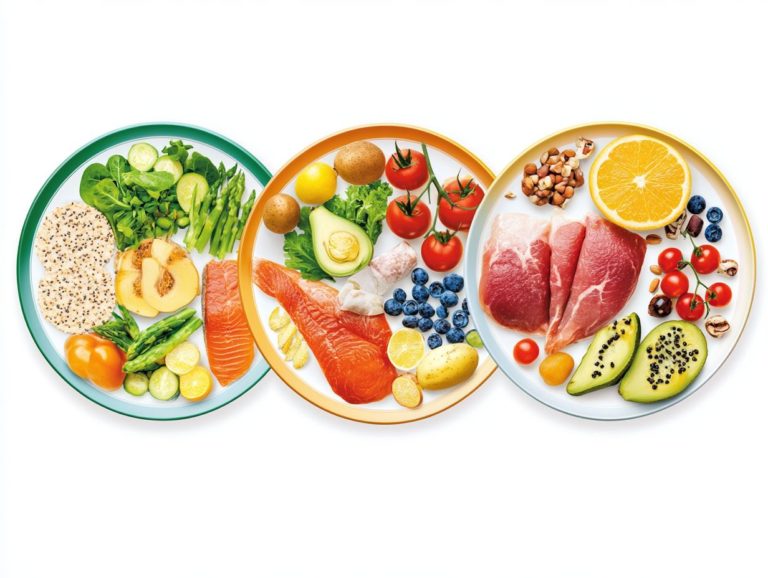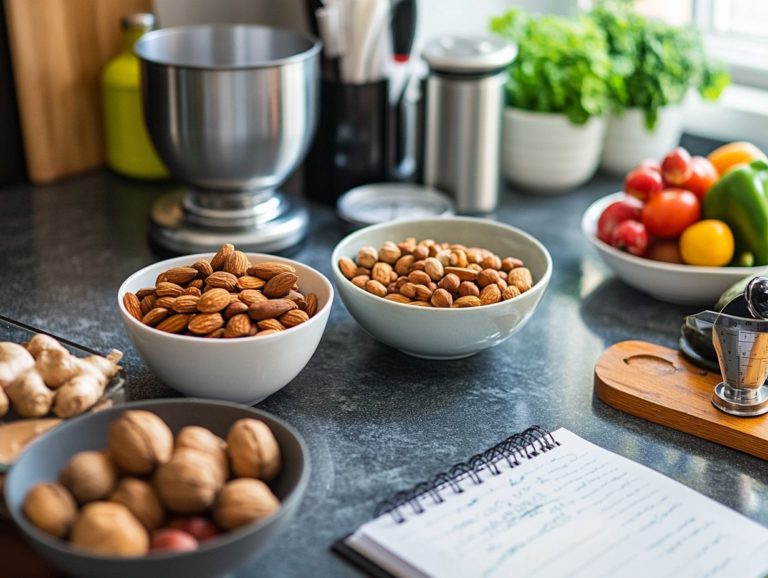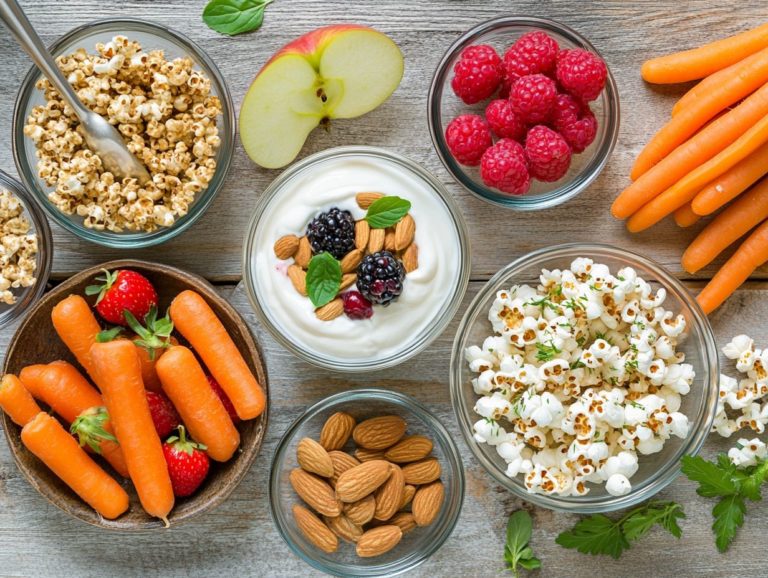5 Reasons to Keep a Food Journal for Better Nutrition
Keeping a food journal can truly revolutionize your approach to nutrition. By tracking what you consume, you ll uncover patterns and pinpoint triggers that shape your eating habits.
This article delves into five compelling reasons to embark on your food journaling journey, from fostering mindful eating to supporting effective weight management. It also offers insights on what to include in your journal, how frequently to update it, and the long-term benefits you can reap.
Dive in to discover how this straightforward tool can transform your relationship with food!
Contents
- Key Takeaways:
- 1. Helps Identify Eating Patterns and Triggers
- 2. Encourages Mindful Eating
- 3. Aids in Tracking Nutrient Intake
- 4. Can Help with Weight Loss or Maintenance Goals
- 5. Provides Accountability and Motivation
- What Should Be Included in a Food Journal?
- Frequently Asked Questions
- What are the benefits of keeping a food journal?
- How can a food journal improve my nutrition?
- Will keeping a food journal help me lose weight?
- Can a food journal help with managing food allergies or sensitivities?
- How often should I update my food journal?
- Is there a specific format for keeping a food journal?
Key Takeaways:
- Keeping a food journal can help identify eating patterns and triggers, allowing for better understanding of one’s relationship with food.
- A food journal promotes mindful eating, leading to healthier food choices.
- Tracking your nutrient intake helps ensure you meet your daily nutritional needs.
1. Helps Identify Eating Patterns and Triggers
Understanding your eating patterns and triggers is crucial for cultivating healthy habits and reaching your health goals.
By incorporating mindful eating techniques, you can start to identify emotional eating behaviors that lead you to make poor food choices.
Through the practice of food journaling, you can pinpoint specific times and situations when cravings hit. This shines a light on emotional triggers related to stress, boredom, or social interactions.
This self-reflection not only promotes accountability but also deepens your understanding of your relationship with food a vital step in breaking free from damaging cycles.
Tracking your food intake encourages a more intentional approach to eating, enabling you to make informed choices that align with your health objectives.
With this newfound awareness, you can gradually shift toward more positive eating behaviors, avoiding impulsive decisions driven by emotions and paving the way for a sustainable journey to wellness.
2. Encourages Mindful Eating
Mindful eating invites you to forge a deeper connection with your food. It encourages you to become more attuned to your eating habits and emotional responses during meals.
This practice employs mindfulness techniques that help you concentrate on the sensory experience of eating. This effectively diminishes tendencies toward emotional eating and enhances your overall dietary choices.
By cultivating this awareness around eating, you can develop healthier behaviors that align seamlessly with your health goals.
To weave mindful eating into your daily routine, start with simple techniques. Take a few deep breaths before your meals to ground yourself or slow down to truly savor each bite, fully appreciating the flavors and textures.
This conscious attention amplifies your enjoyment and sharpens your ability to recognize hunger and fullness cues.
By understanding your emotional triggers whether they re stress, boredom, or something else you enable yourself to make more deliberate choices and steer clear of impulsive eating patterns.
Over time, this practice can make you truly appreciate your food and cultivate a more sustainable and satisfying relationship with nourishment.
3. Aids in Tracking Nutrient Intake
Tracking your nutrient intake is essential for understanding and meeting your nutritional needs, and food journaling is an effective way to accomplish this.
By consistently logging your daily calories and intake of carbohydrates, proteins, and fats, you can monitor your food consumption and make informed decisions about your dietary choices.
This practice not only helps you keep track of calories but also provides valuable insights that support your overall health and wellness.
As you maintain a detailed record, you can identify patterns in your eating habits. This allows you to adjust your intake according to your specific health goals whether it s weight loss, muscle gain, or simply boosting your energy levels.
Recognizing the balance between carbohydrates, proteins, and fats enables you to tailor your meals to better align with your lifestyle and preferences.
Ultimately, this heightened awareness can lead to more mindful eating practices, helping you cultivate a healthier relationship with food and enhancing your overall well-being.
Start your food journaling journey today and enjoy the benefits of improved nutrition and health!
4. Can Help with Weight Loss or Maintenance Goals

Food journaling can be a game-changer in your weight management journey. Whether you’re aiming to shed pounds or maintain your current weight, tracking your calories and food intake can help.
You can develop a clear picture of your eating habits. This makes it much easier to spot areas that could use a little improvement. Incorporating meal planning and smart food tracking techniques enables you to pursue your health goals more effectively and sustainably.
This practice reveals patterns in your eating behavior and cultivates a greater awareness of portion sizes. Strategies like preparing meals in advance or exploring healthful recipes can simplify your routine and diminish the allure of unhealthy choices.
By implementing behavioral techniques such as setting small, achievable goals you reinforce positive habits. Celebrating your progress helps maintain a consistent commitment to your health.
Over time, these strategies may lead to lasting dietary changes. They support a healthier lifestyle that feels both manageable and enjoyable as you navigate your weight management journey.
5. Provides Accountability and Motivation
Maintaining a food journal fosters accountability and motivation in your journey toward healthier nutrition habits. By regularly documenting your food intake and eating behaviors, you create a tangible record of your progress.
This serves as a powerful motivational tool. This level of accountability can help manage emotional eating and encourage you to make healthier dietary choices.
Tracking each meal makes you more aware of food decisions. It also enables you to reflect on your eating patterns, leading to valuable insights about your cravings and habits.
This reflective practice makes it easier to identify the triggers that prompt unhealthy choices. As you visualize your progress through your written records, celebrate those small victories along the way, reinforcing positive behaviors.
The psychological benefits extend beyond mere tracking. It often instills a sense of control, motivating you to commit to your health promotion efforts with even greater enthusiasm and dedication.
What Should Be Included in a Food Journal?
A comprehensive food journal should encompass various elements to effectively track your dietary choices and health-related symptoms. This means not just noting the types of food you consume but also keeping an eye on portion sizes, the times you eat meals, and any feelings or emotional triggers that arise during meals.
Including symptoms like bloating, fatigue, or mood swings can provide invaluable insights into how specific foods impact your overall well-being. By tracking these emotional states alongside your eating habits, you enhance your self-awareness, enabling you to better understand your relationship with certain foods.
As you note patterns over time, you ll be able to identify which foods lead to discomfort and the emotional contexts tied to your cravings. This holistic approach will help you make informed dietary choices, guiding you toward healthier, more satisfying options that align with your health objectives.
How Often Should a Food Journal Be Updated?
Updating your food journal regularly is essential for accurate food logging and effectively tracking your daily calorie intake and eating schedule. Ideally, aim to document your meals and snacks in real-time to maintain the integrity of your food journal.
Consistent documentation fosters greater awareness of your eating patterns. It significantly contributes to achieving your health goals.
It s advisable to update your journal at least three times a day after breakfast, lunch, and dinner. Also include a quick note for any snacks.
This practice allows you to capture each eating occasion and minimizes the chances of forgetting what you consumed throughout the day.
By emphasizing real-time logging, you can better recognize cravings, portion sizes, and food choices as they occur. This is much better than attempting to piece together meals from memory later.
These real-time entries often provide more detailed insights into your mood and hunger levels, offering a richer context for reflection and informed adjustments to your dietary habits.
How Can a Food Journal Be Used to Improve Eating Habits?

A food journal is an invaluable tool for enhancing your eating habits by helping you understand your choices. By consistently reviewing your entries, you can identify trends and triggers that influence your eating behaviors. This awareness paves the way for targeted interventions and effective ways to change habits.
This process nurtures mindful eating and supports ongoing health monitoring, leading to more sustainable dietary changes. By recording your meals and snacks, you gain insights into not only what you eat but also how and why you make certain choices.
This deeper understanding reveals emotional eating patterns and habitual snacking that might otherwise go unnoticed. The act of reflection allows you to set specific goals, helping you create actionable strategies like incorporating more fruits and vegetables or cutting back on processed foods.
This practice helps you take charge of your nutrition, steering you toward a healthier lifestyle and more deliberate decision-making at mealtimes.
What Are the Common Challenges with Keeping a Food Journal?
Keeping a food journal can come with challenges that may hinder your journey toward healthier eating habits. You may face time constraints, emotional eating, or simply forget to log your meals.
Understanding these obstacles can help you implement techniques that promote consistent journaling and support necessary dietary changes. To tackle time constraints, dedicate just a few minutes at the end of each day to make the task feel less daunting.
When emotional eating creeps in, using mindfulness techniques or identifying specific triggers can help you recognize when you’re eating for reasons other than hunger. Setting up reminders on your smartphone or placing your journal in a prominent spot can combat forgetfulness!
This ensures that logging your meals becomes a seamless part of your daily routine rather than an afterthought. This holistic approach fosters consistency and deepens your understanding of your eating habits.
How Can Technology Help with Food Journaling?
Technology has completely transformed the landscape of food journaling! It has made it more accessible and user-friendly through various apps and platforms like MyFitnessPal.
These tools offer convenient food tracking options, allowing you to log your meals quickly and efficiently while providing valuable insights into your dietary choices. Such advancements elevate health monitoring and enable you to achieve your wellness goals.
With features like barcode scanning, which allows you to quickly log food by scanning its packaging, portion size estimation, and customizable meal categories, these applications simplify the tracking process. They enable you to maintain a comprehensive food diary effortlessly.
Many of these platforms also work with wearable devices, allowing for real-time logging of your calorie intake and physical activity. This creates a dynamic synergy between your diet and exercise, encouraging you to make informed decisions about your health.
By analyzing trends over time, you can identify patterns in your eating habits, making it easier to adjust your diet as needed for improved overall wellness.
What Are the Potential Benefits of Keeping a Food Journal in the Long Run?
The long-term benefits of keeping a food journal extend beyond just changing your diet; they help you understand your eating habits and health goals. Over time, you ll develop healthier eating habits, become more mindful of your food choices, and increase your accountability on this nutritional journey.
This commitment to food logging can lead to significant improvements in your overall health and well-being.
As you track your meals and snacks, you ll start to recognize patterns that trigger unhealthy eating behaviors or cravings. This awareness allows you to make informed decisions. It not only improves your ability to choose wisely but also helps create a positive relationship with food.
By consistently reflecting on your dietary habits, you may experience better weight management, increased energy levels, and a reduced risk of chronic diseases. Imagine how quickly writing down your meals can transform your health journey!
Frequently Asked Questions

Here are some common questions about keeping a food journal:
What are the benefits of keeping a food journal?
Keeping a food journal helps you:
- Become more aware of your eating habits
- Track the nutrients you eat
- Identify food triggers
- Monitor your progress
- Hold yourself accountable
How can a food journal improve my nutrition?
By maintaining a food journal, you can easily spot areas where your nutrition may be lacking and make adjustments to improve it. You can also track the nutrients you eat and ensure you meet your daily requirements.
Will keeping a food journal help me lose weight?
Yes, a food journal can be a helpful tool for weight loss. It helps you identify patterns in your eating habits, make healthier choices, and control portion sizes.
Can a food journal help with managing food allergies or sensitivities?
Absolutely! A food journal can help you pinpoint potential food allergies or sensitivities by tracking symptoms after eating certain foods. It s also useful for finding hidden sources of allergens in your diet.
How often should I update my food journal?
It s best to update your food journal after every meal or snack for accuracy. If that s not possible, aim to update it at least once a day.
Is there a specific format for keeping a food journal?
There is no one-size-fits-all format for a food journal. You can use a notebook, a smartphone app, or an online program. Choose a method that works best for you and one that you will stick with.






